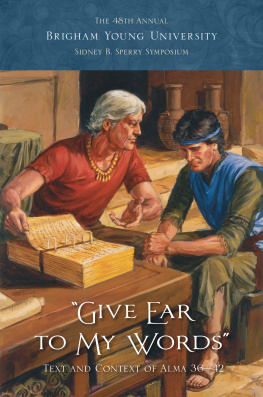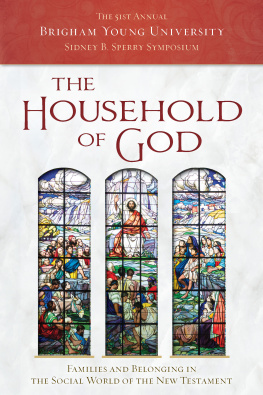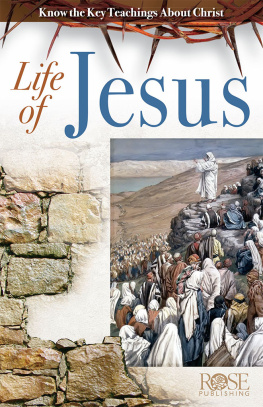Preface
A lma instructs his sons Helaman, Shiblon, and Corianton on specific doctrines and practices relative to each of their individual situations and challenges in chapters 3642 of the book of Alma. These deeply personal writings contain some of the most informative doctrinal discussions in scripture. Originating out of the love and concern of a parent, these chapters present salient teachings on key gospel principles, proper behaviors, and correct theology, and here the pure doctrines of Gods merciful plan of redemption through his Son, Jesus Christ, are laid plain.
The doctrines found within Alma 3642 were addressed in the essays delivered at the 2019 Sidney B. Sperry Symposium held at Brigham Young University. This volume, titled Give Ear to my Words: Text and Context of Alma 3642 , compiles those essays. The chapters are organized into four primary sections: (1) doctrine, (2) historical content, (3) parents and children, and (4) literary structure, devices, and techniques. The keynote speaker was Tad R. Callister, who was recently released as the General President of the Sunday School of The Church of Jesus Christ of Latter-day Saints.
Drawing on both academic training and dedicated study of the scriptures, the authors in this volume provide valuable new contexts to understand Almas doctrinal expositions. While the material in the majority of the chapters is generally accessible, some chapters engage their topic with additional expertise and detail. In this way, the volume will speak to different people at different levels, but in all cases, we hope it will expand the minds and understanding of the readers.
We have many people to thank for their efforts both in organizing the symposium and in the publication of this volume. To the many reviewers who gave of their time and expertise to help shape and improve each of the papers, we express our appreciation. We are also grateful to the editors and staff at the Religious Studies Center at Brigham Young University. We appreciate the editorial oversight of Shirley S. Ricks and the assistance of her interns Emily Cook and Abigail Crimm. We thank Emily V. Strong for her design and typesetting skills, which have greatly enhanced the volume. Finally, we want to express our thanks to the authors in this volume and the speakers at the symposium who enlightened and inspired through their knowledge and faith.
Kerry M. Hull
Nicholas J. Frederick
Hank R. Smith
Beverly Yellowhorse
Brent Nordgren
2019 Sperry Symposium Committee
What Is the Purpose of Suffering?
Tad R. Callister
A lma the Younger was no stranger to affliction and suffering. It seemed to be his constant companion. He fought in hand-to-hand combat defending his people (Alma 2:29). He was rejected, reviled, spit upon, and cast out of Ammonihah, being weighed down with sorrow, wading through much tribulation and anguish of soul because of the sins of his people (Alma 8:1314). He was pained as he witnessed righteous men, women, and children being cast into a fiery pit at the hands of the wicked (Alma 14:10). He was bound, imprisoned, and physically abused (Alma 14:1415); the wicked gnashed their teeth upon him, spit upon him, mocked him, and withheld food and water from him so that he suffered for many days (Alma 14:2123). His heart was exceedingly sorrowful because of the iniquities of the people (Alma 35:15), and he had been racked with eternal torment because of his own sinful past (Alma 36:12). Suffice it to say, Alma was acquainted with grief.
Alma knew that his righteous son Helaman would likewise face adversity. Accordingly, Alma commenced his counsel to Helaman as recorded in Alma 36 by addressing the subject of affliction. He exhorted him to remember the captivity of our fathers; for they were in bondage, and none could deliver them except it was the God of Abraham [who] surely did deliver them in their afflictions. Alma then continued: And now, O my son Helaman, behold, thou art in thy youth, and therefore, I beseech of thee that thou wilt hear my words and learn of me; for I do know that whosoever shall put their trust in God shall be supported in their trials, and their troubles, and their afflictions, and shall be lifted up at the last day (Alma 36:23; emphasis added throughout). The essence of his counsel was that Helaman, even though he was righteous, would still face his share of afflictions, but if he put his trust in God, the day of deliverance would come when he would be lifted upmeaning exalted. No doubt this counsel was included in the Book of Mormon because it is applicable to each of us as we face the inescapable afflictions of life. In fact, one key reason for the gospel is to give purpose to suffering, to help it make sense, so we can hold on and have hope even in moments of excruciating pain and despair.
Questions about Affliction and Suffering
The subject of affliction and its corresponding companion, suffering, raise some thought-provoking questions.
- Who or what causes affliction and suffering?
- Why does God intervene and alleviate suffering for some but not for others?
- Does all suffering lead to positive growth?
- How does God help us face our afflictions?
- How should we respond to affliction and suffering?
- What is the ultimate objective of suffering in Gods plan?
The following is an attempt to provide some answers to those questions, inspired in part by Almas counsel to his son Helaman.
Who or What Causes Affliction and Suffering?
Is the answer Satan, others, ourselves, our mortal condition, natural causes, God, all of these, or only some of them?
Satan is certainly a cause of some affliction as evidenced by the experience of Job: [Satan] smote Job with sore boils from the sole of his foot unto his crown (Job 2:7). Furthermore, the scriptures tell us that because he [Satan] had fallen from heaven, and had become miserable forever, he sought also the misery of all mankind (2 Nephi 2:18). Suffice it to say that Satan is a prime perpetrator of misery and affliction.
Mortals also cause affliction and sufferingfor themselves and for others. This is evidenced by widespread domestic abuse, sexual abuse, dishonesty, murder, fraud, reckless driving, and other cases of negligence and sinful conduct.
There are also afflictions for which, it seems, no one is to blame. Our mortal condition subjects us to natural disasters such as earthquakes, famines, hurricanes, and the likefor as the Lord said, Your Father which is in heaven maketh his sun to rise on the evil and on the good, and sendeth rain on the just and on the unjust (Matthew 5:45). Enoch observed, Because that Adam fell, we are; and by his fall came death; and we are made partakers of misery and woe (Moses 6:48). Death, infirmities, and accidents are a natural consequence of our fallen condition. In other words, God allows natural laws to take their natural course against the just as well as the unjust.
But what about God? Does He cause affliction? The Lord has caused affliction to come upon the wicked as evidenced by His many warnings to the wicked, which were followed by wars, fires, earthquakes, hurricanes, famines, and other devastations.













